In Matters of Divorce, as in Uber’s ‘Surge Pricing,’ What’s Unjust Isn’t Always Illegal
This week’s ‘Daf Yomi’ probes the connection between the magical thinking of the Bible and the rational concerns of the Talmud




Literary critic Adam Kirsch is reading a page of Talmud a day, along with Jews around the world.
What would the rabbis say about Uber’s surge pricing? The question might sound like a joke; but in fact, the issue of whether it is fair to charge higher prices at moments of special need was directly addressed in this week’s Daf Yomi reading. Uber, the car service, has gotten a lot of bad publicity for raising its prices two or threefold during times of great demand, such as during Hurricane Sandy, or on New Year’s Eve. The company defends itself on the grounds of supply and demand: The higher the charge, the more drivers will come out to work, and the more people will be able to find rides. But this convenient explanation hasn’t silenced Uber’s critics, who feel that there is something inherently wrong about hiking prices for a service when people most need it—what we usually describe as price gouging.
In Yevamot 106a, the rabbis considered an analogous situation, which even involves a method of transportation. Say that a man is running away from prison, and he comes upon a ferry. To convince the ferryman to take him across the river, he agrees to pay a whole dinar, much more than the usual price. Is the escaped prisoner bound to honor the agreement? In other words, does the ferryman have the right to charge a higher price to a passenger who is in dire straits? The rabbis’ answer is no: “The ferryman receives nothing other than his usual rate.” The passenger is even entitled to say to the ferryman, “I was deceiving you,” since he never intended to pay the whole dinar. The ferryman, in some sense, deserves to be lied to, since he is trying to extort an unfair profit. Try that with Uber next New Year’s Eve and you won’t get very far, but at least you will have Talmudic sanction.
This surprisingly contemporary point of law came up during the rabbis’ discussion of an extremely ancient ritual—a combination of the remote and the familiar that feels characteristic of the Talmud. Since the beginning of Tractate Yevamot, which deals primarily with levirate marriage, we have heard that although a man is legally obligated to marry his dead brother’s widow, there is an escape clause. If either party doesn’t want to go through with the marriage, they can perform the ceremony called chalitza, or “removal.” The form of this ceremony is spelled out in Deuteronomy: In front of a court of elders, the woman must remove the man’s shoe and spit in front of him, while saying, “So shall it be done to the man who does not build his brother’s house.”
In front of a court of elders, the woman must remove the man’s shoe and spit in front of him, while saying, “So shall it be done to the man who does not build his brother’s house.”
There is something very primitive-feeling about this ritual. Like the ceremony of the scapegoat, discussed at length earlier in the Talmud, it seems to reach back into a distant past when actions had a magic power. Yet over the thousand-plus years that separated the book of Deuteronomy from the Babylonian Talmud, the strangeness of the ritual was diminished by the way the sages enfolded it in the logic of law. From a kind of sympathetic magic it has been turned into a technicality, which must be performed in just the right way if it is to be legally effective. These technicalities form the subject of chapter 12 of Yevamot, which Daf Yomi readers explored this week.
The mishna that begins the chapter addresses some of the most obvious questions raised by the biblical passage. How many elders must be present for chalitza, and what qualifications must they have? The answer is three, and they don’t need any special legal knowledge, as long as they can read Hebrew. What kind of footwear must be used? It can be a shoe or a sandal, so long as it is made of leather and has a hard heel; a soft shoe made of cloth doesn’t qualify. Which foot should the shoe be removed from? The right, but if the man doesn’t have a right shoe, he can put his left shoe on his right foot and have his yevama remove that. If he doesn’t have a shoe at all, he can wear someone else’s, provided that it is formally given to him and becomes his property.
But the rabbis don’t stop there. Here we have a case where a legal contract, a kind of divorce, is dependent on a physical action. Instead of simply saying a formula or writing a document, as in most legal transactions, the parties have to remove a shoe and spit. But what if the man or the woman is physically incapable of doing this? For instance, what if the man has no feet, or the woman has no hands? These questions strike me as good examples of what makes the Talmud Talmudic. At first hearing, they may seem ludicrous, because they take the law so literally and cover such remote, unlikely possibilities. On deeper reflection, however, they make a great deal of sense. They are a way for the rabbis to probe the connection between the magical thinking of the Bible and the rational concerns of the Talmud. How can a ritual that might exclude some people, on account of their disability, be rendered truly universal, as a law must be?
The case of the woman with no hands is addressed in Yevamot 105a. A sage named Levi was dispatched to teach Torah “to the villages,” and he was asked, “what is the halakhah for an armless woman, may she perform chalitza?” At first Levi was stumped, so he returned to the beit midrash and asked his colleagues, who replied: “Does it say in the Torah, she shall remove the shoe by hand?” Exactly how the woman is to remove her brother-in-law’s shoe is not specified, so if she has no hands, she may do it with her teeth. This is a good example of the way the rabbis look to the letter of the law, while still exercising intellectual creativity: The ritual must be performed, but there are alternative ways of getting it done. As for the man with no feet, his case addressed in the mishna in Yevamot 101a: His yevama may remove a shoe from his prosthetic foot, provided his leg was amputated below the knee. If his leg was amputated above the knee, or if he was born club-footed, however, he is without recourse, and can’t participate in chalitza at all.
There is a strong implication that the biblical ceremony of chalitza—the removal of the shoe, the spitting, the words of reproach—is designed to humiliate the unwilling groom. It seems that the Bible wanted to discourage chalitza, making it an ignoble way out of a sacred obligation. But in the rabbis’ later and more rational view, there is nothing humiliating about performing chalitza in place of levirate marriage. On the contrary, it is sometimes positively encouraged, as we read in Yevamot 101b. Why, the rabbis ask, does the Bible instruct that the ceremony be performed in front of elders? It is so that they can give advice to the man and woman as to whether they are a suitable match: “If he was a young boy and she was elderly, or if he was elderly and she was a young girl, they would tell him not to enter into levirate marriage. … ‘Go be with someone like yourself, and do not bring a quarrel into your household,’ ” they would counsel.
The rabbis were especially sympathetic toward a woman who didn’t want to be forced into marriage with her brother-in-law. Indeed, as we read in Yevamot 106a, if the woman didn’t want to get married but the man did and so refused to perform chalitza, the rabbis would even conspire with her to deceive him. Like the prisoner with the ferryman, this was considered a justifiable form of deception, since the brother-in-law too was trying to extort something from a person in need.
On one occasion, Rabbi Chiyya heard a case involving a woman who absolutely refused to marry her brother-in-law: “Rabbi Chiyya said her: Is he not amenable to you? She said to him, No.” Taking advantage of the man’s ignorance of the law, the sage then told him that the ceremony of chalitza would actually marry the couple, when in fact, of course, it would prevent them from marrying. Once the ceremony was over, Chiyya sprang the truth on the unwitting man: “Now she is disqualified for you forever.” Any legal system has to face difficult cases where the demands of law and the demands of justice are at odds. In this case, the rabbis went to great lengths to make sure that a woman had justice, even if the law itself had to suffer.
***
To read Tablet’s complete archive of Daf Yomi Talmud study, click here.
Adam Kirsch is a poet and literary critic, whose books include The People and the Books: 18 Classics of Jewish Literature.
Adam Kirsch is a poet and literary critic, whose books include The People and the Books: 18 Classics of Jewish Literature.